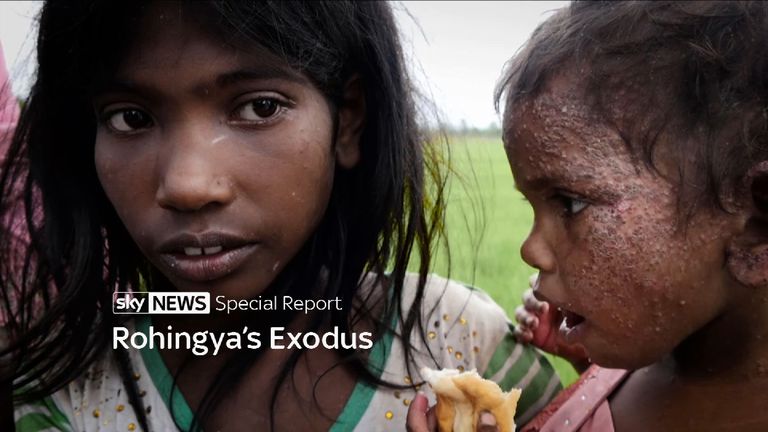Hidden: Rohingya camp that the Pope will not see on Myanmar visit
Rohingya Muslims have risked being tortured and beaten to show Sky News a camp where hundreds of people are living in fear.
Tuesday 28 November 2017 10:48, UK
Pope Francis has begun a delicate trip to Myanmar, a country accused of "textbook ethnic cleansing" against Rohingya Muslims.
As the pontiff meets Myanmar's president, as well as its de facto leader Aung San Suu Kyi, Sky's special correspondent Alex Crawford has gained access to somewhere he will not be allowed to see: a camp where hundreds of Rohingya fear for their lives.
Two armed policemen and a plain-clothed official barred our way to the Rohingya camp in the southern part of Myanmar's Rakhine state.
This is the underbelly of this Buddhist-dominated country which the authorities do not want the Pope to see.
Journalists, both local and international, are very definitely not welcome here.
Sky's efforts at getting official "permission" proved fruitless - most permission is simply not granted.
:: Explained: The Rohingya refugee crisis
:: Rohingya treatment amounts to 'dehumanising apartheid' - Amnesty report
Even aid agencies find it difficult to get access to these areas which are essentially ghettos. They want to deliver food and medical supplies there. One group told us they have to get around a dozen forms stamped and approved by the Myanmar authorities before being allowed to go inside the camp.
The authorities in Myanmar, also known as Burma, cite "security" as the reason why access is severely restricted. They say the Rohingya are Muslim extremists bent on terror activities.
We found an alternative, secret way in to see one camp for ourselves, using a network of Burmese who risk their freedom and who know they face being tortured or beaten for helping us.
Inside the camp, we found hundreds of frightened Rohingya Muslims who are outcasts in their own country.
They spoke of being denied schooling for their children; of being unable to get jobs; of their every movement being controlled and restricted because they are followers of Islam and belong to an ethnic group describing themselves as Rohingya Muslims.
In the eyes of the Myanmar authorities and many of the Buddhist population, they simply don't exist. We were told countless times to stop calling them Rohingya.
"They are not Rohingya," we were lectured.
"There is no such group in Myanmar such as Rohingya Muslims."
Instead, the government and many of its nationalist followers prefer to describe them as Bengalis, suggesting they come from neighbouring Bangladesh. This is despite them having lived in Myanmar for generations.
One man told us: "We are not allowed into Sittwe (the nearest main town and capital of Rakhine state).
"It is not allowed by the Government. If we go, we will be killed."
:: 'Ethnic cleansing': US verdict on violence against Rohingya Muslims
Another told us how he was arrested by police after straying outside to collect firewood. He was beaten and then hauled before the courts, where he was accused of being a terrorist and jailed for 25 months.
The camp has several hundred people living in it. Most of them are displaced families who were driven out of their homes in other parts of Rakhine state when the last violence erupted in 2012. Then there were reports of a Muslim man raping a young Buddhist girl.
The army employed the same tactics then as they are now, burning homes and driving terrified Rohingya Muslims away. They've been in these camps ever since, living but without freedom or rights.
It is what a two-year-long Amnesty International investigation called a type of "apartheid", similar to that employed in South Africa against black people before they got democracy in 1994.
But there's little sympathy among Myanmar's mainly Buddhist population. They blame the Muslims for the ethnic violence and many applaud the military for a three-month-long crackdown which has seen an exodus of more than 600,000 Rohingya Muslims since late August.
One of the leaders of Ma Ba Thaw, an extreme anti-Muslim group, told us: "There's no way the Myanmar soldiers would rape the Muslim women because the Muslim women are too ugly."
His view was repeated by another senior supporter in an interview done in a different location and entirely separately. It seems to be a widely held view.
One of the Ma Ba Thaw leaders, U Eaindra Sekka Viwontha, told Sky News the reports of ethnic cleansing were wrong.
He said that those leaving were not being forced to go but had made the decision to leave themselves.
They had burned their own homes in order to curry sympathy with the international community, he claimed, denouncing the refugees as "terrorists" and the fleeing thousands as "terrorists and the families of terrorists".
:: Sky crew: Harrowing plight of Rohingyas in Myanmar will stay with us
:: Aung San Suu Kyi stripped of Freedom of Oxford over Rohingya violence
It is into this toxic mix that Pope Francis enters. Even using the word Rohingya is likely to incur an extreme reaction from Buddhists, who will see the term as offensive and inflammatory.
Yet if the pontiff fails to adequately address the unrest, described by the UN as a "textbook example of ethnic cleansing", it will be widely seen as a terrible missed opportunity to speak out for one of the world's most persecuted minorities.
As one of the displaced Rohingya Muslims told us: "The Myanmar soldiers want to kill all of us and push us all out of the country."
Whether its ethnic cleansing or genocide matters very little to those enduring it.








